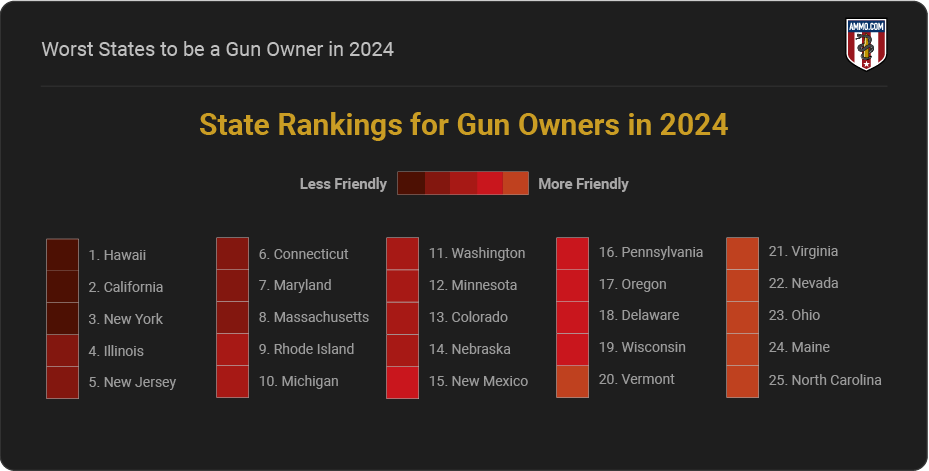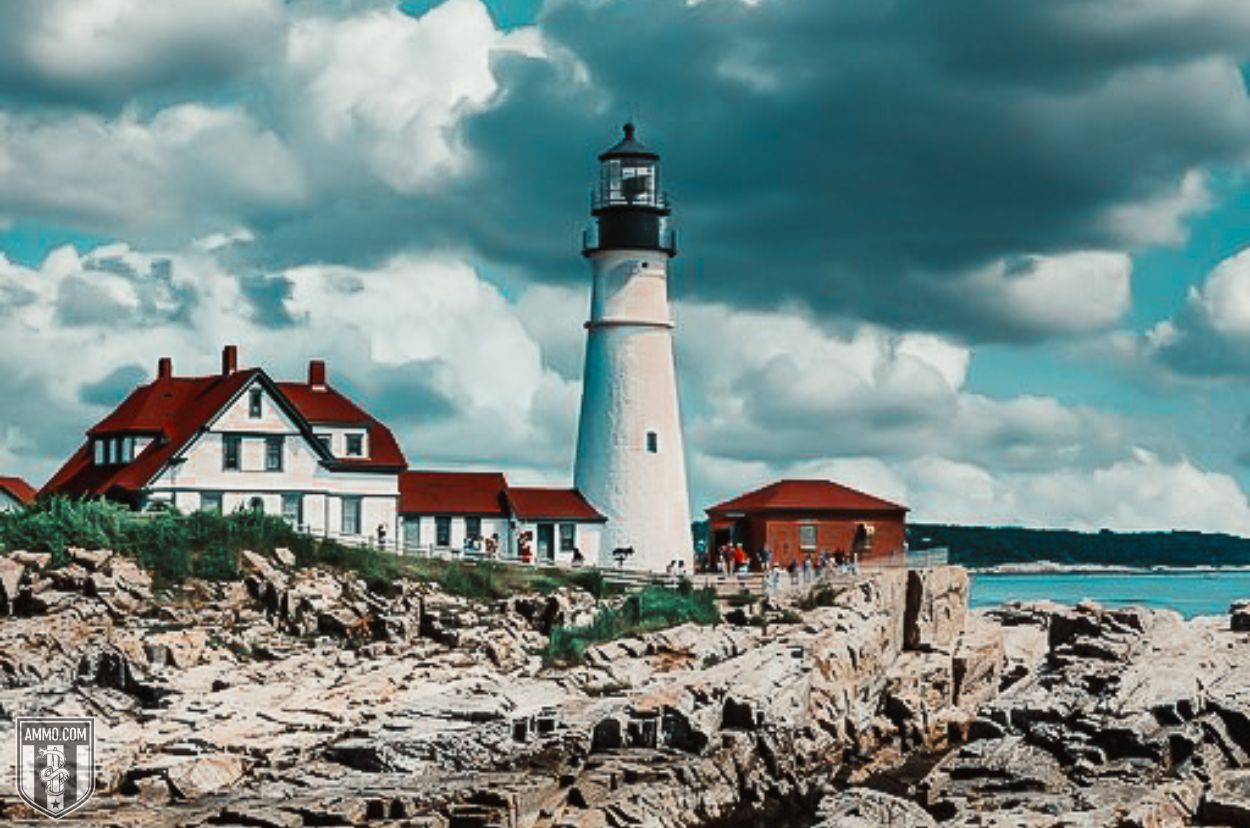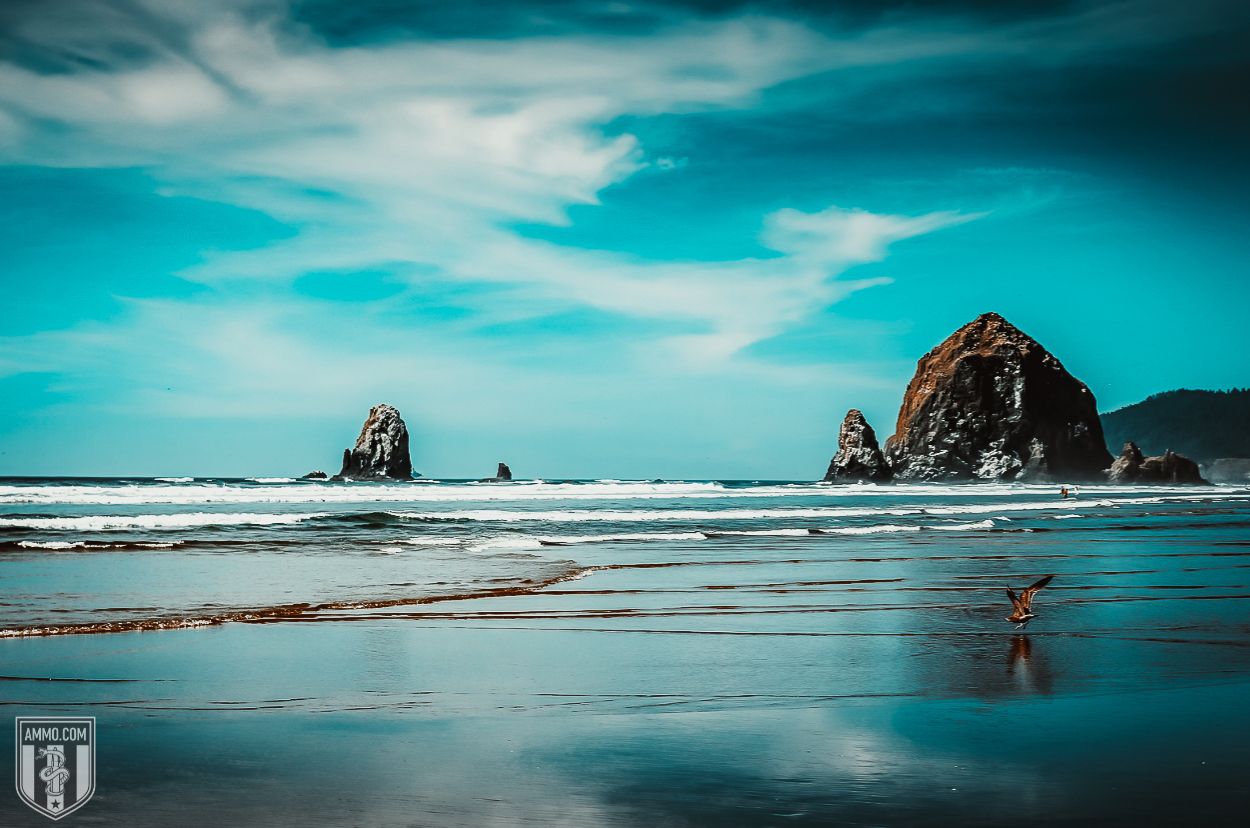Worst States to be a Gun Owner (2024 Updated)
Does your state support your 2nd Amendment rights or make it exceedingly difficult to keep and bear arms? We’ve ranked the worst states to be a gun owner below. How? By analyzing each state’s current laws, upcoming laws, concealed carry guidelines, self-defense statutes, and 2A-centric taxes in order to identify the worst states for gun owners in 2024.
Jump to a state: AL | AK | AZ | AR | CA | CO | CT | DE | FL | GA | HI | ID | IL | IN | IA | KS | KY | LA | ME | MD | MA | MI | MN | MS | MO | MT | NE | NV | NH | NJ | NM | NY | NC | ND | OH | OK | OR | PA | RI | SC | SD | TN | TX | UT | VT | VA | WA | WV | WI | WY
Report Highlights:
Hawaii is the #1 worst state for gun owners due to strict purchasing and carry laws, as well as defying the Supreme Court on the individual’s right to carry.
California is the #2 worst state for gun owners due to its permit-to-purchase and reciprocity laws.
New York, Illinois, and New Jersey take the #3, #4, and #5 spot in our list of worst states for gun ownership due to strict purchasing and carrying requirements.
North Carolina, Maine, and Ohio fall into spots #25, #24, and #23 due to new restrictive legislation with some relaxed carry laws.
Some states rank lower than others due to excessive infringements, additional taxes, and the current Governor’s 2A statements.
State and local laws defining Stand Your Ground vs. Duty to Retreat vary and should be evaluated on a case-by-case basis.
What Did We Measure?
Let’s take a moment to analyze what factors make a state The Worst for Gun Ownership. If we consider only purchasing requirements, we neglect carrying requirements and use of force thresholds. So, we came up with a list based on the following factors:
- Current Gun Laws
- Current Purchase Laws
- Current CCW Guidelines
- Reciprocity Between Other States
- Sales Tax
- Current Governor’s Voting History
- Stand Your Ground Laws
Note: It’s essential to look at each state’s current local and Federal laws. For example, most states define Stand Your Ground and Duty to Retreat differently. It’s a good idea to explore the links below to better understand your State’s laws.

#25 North Carolina
You can open carry in many places in North Carolina as long as you’re a resident and lawfully permitted to possess a firearm. However, you must obtain a concealed firearm permit, and not every city or county allows open carry without one. A North Carolina CHP (Concealed Handgun Permit) allows you to carry in 37 states, while travelers[1] from 48 states can conceal carry with their permits.
Unfortunately, you won’t get a tax exemption on any firearms, ammunition, or accessories. But if you ever find yourself in a life-threatening situation, the state offers protection against civil and criminal liability[2].
The state legislature recently vetoed a bill for those who prefer to purchase firearms without additional steps, and residents no longer need permits to purchase firearms. However, Governor Roy Cooper did support the bill, so North Carolina’s position on this list is a toss-up.
#24 Maine

Maine is an open-carry state[3] where anyone over 21 who is also legally allowed to possess a firearm can carry. In accordance with federal laws, only those over 21 can purchase handguns[4] in Maine, while those over 18 can purchase shotguns or rifles (which is pretty standard on this list).
You don’t need to register your firearms in Maine, but you do have to sign an acknowledgement that you received a Safe Storage pamphlet with every purchase. Maine also offers tax exemptions[5] for safety devices such as safe storage boxes and trigger guards. However, the state also has yellow flag laws authorizing law enforcement to remove dangerous weapons[6] from perceived threats.
You can’t own, possess, or purchase a firearm if you have a pending domestic violence charge[7], order of protection, or pending felony charges.
Recently, Governor Janet Hills switched from opposing gun control legislation to supporting it[8] after a deadly mass shooting. The governor now plans to implement statewide background checks and ERPOs (despite having one of the lowest gun-related death rates in the nation).
#23 Ohio
Ohio is a Constitutional carry state where anyone over the age of 21 can carry a firearm without a permit, as long as they aren’t already prohibited from doing so. However, the state does issue CHLs (Concealed Handgun licenses[9]). These licenses allow gun owners to carry in 38 other states, and Ohio accepts travelers’ permits from 49 states.
Firearms purchasers will still pay the standard sales tax rates and must pass a federal background check when purchasing a firearm from an FFL dealer. Those who sell guns regularly in Ohio (and everywhere else in the U.S.) must obtain an FFL or face federal charges.
Ohio law protects those in a life-threatening situation. For example, the prosecutor carries the burden of proof, and the state has both Castle Doctrine and stand-your-ground exceptions[10], with no duty to retreat.
Perhaps you’re surprised to see Ohio on this list. Currently, Governor Mike DeWine[11] is asking the Ohio state legislature to enact more gun control measures (including tightening down on background checks and ERPOs) to keep gun owners from exercising their 2A rights.
#22 Nevada

Nevada is an open-carry state where anyone over the age of 18 can carry a firearm. Those who like to travel or prefer to conceal carry must apply for a CCW (the Nevada CCW does have many restrictions[12]). However, once obtained, you can carry a firearm in 33 states, and travelers coming from 27 states will find that Nevada honors their CCWs.
Private firearm sales in Nevada are still subject to background checks[13], but you don’t have to register your guns. The state doesn’t have safe storage laws, but it also doesn’t give tax exemptions for firearms, ammunition, or accessories.
If you’re in a situation where you must defend your life, Nevada’s laws may protect[14] you from criminal prosecution. You have a right to stand your ground and no duty to retreat. Moreover, the state has a castle doctrine that protects reasonable acts of self-defense in the home.
Governor Steve Sisolak recently signed Red Flag legislation[15] and supports more restrictions on gun owners in the state. While Nevada isn’t anywhere near the worst state for gun owners at the time of writing, it may head further down our list in the coming years.
#21 Virginia
Virginia is another open-carry state with many restrictions. For example, there’s a long list of places[16] you can’t legally carry a firearm, and you’ll need the state’s CHP to conceal a firearm. Furthermore, there are some districts where gun owners can’t even open-carry, so be sure to look into local ordinances. If you do obtain a CHP, you can conceal carry and travel to 35 states (Virginia honors permits from 48 states).
Virginia doesn’t require firearm registrations or permits to purchase firearms. However, even private sellers must seek out an FFL dealer to run a universal background check[17] to adhere to new laws. Gun owners in the state won’t see any firearm-related tax exemptions either.
The state has some statutes supporting a castle doctrine with no duty to retreat[18] (if the situation is in your own home and you aren’t the aggressor). However, the laws are quite flimsy with respect to personal defense scenarios.
Virginia was on the brink of Red Flag Laws; however, the new governor, Glenn Youngkin, opposes gun control measures[19] and tends to lean toward mental-health-related solutions.
#20 Vermont

While it’s true that anyone legally allowed to carry a firearm can do so in Vermont without a permit, the state made this list because some of its laws make it more difficult for gun buyers to obtain a firearm.
For example, it’s illegal to sell a firearm in Vermont without an FFL[20]. Also, anyone under twenty-one is prohibited from purchasing firearms. Vermont also limits magazine capacity and firearm accessories like bump stocks.
Vermont has more restrictive background checks than many other states. For example, unless gifting a firearm to an immediate family member (someone who lives in your home or a parent/sibling), background checks are required.
However, Vermont is also a No-Issue permit state, where they don’t even offer enhanced permits. Depending on how you look at it, this can be a good or bad thing. For example, if you travel, you can only open or conceal carry in states that do not require a permit (check those states before traveling because open carry and concealed carry are different).
Furthermore, Vermont residents do have some protections[21] if they need to use lethal force in self-defense situations, but the state doesn’t have any exemptions[22] for firearms or accessories.
Lastly, Vermont Governor Phil Scott has a history of signing gun control measures[23], so we can be pretty certain the state will remain on this list for some time.
#19 Wisconsin
Wisconsin is an open carry state with a shall-issue carry permit status. While you can visibly carry a firearm (assuming you’re lawfully permitted to possess one), it must be visible unless you have a permit. However, rules also vary depending on local ordinances, so research those before carrying a firearm openly.
Those who want to conceal carry[24] (including carrying in vehicles) must take an 8-hour instructor-led course and go through the Wisconsin Department of Justice (you’ll be approved or denied in 21 days). If you decide to get a Wisconsin CCW, you can carry in 33 states. Travelers from 45 other states can carry in Wisconsin with their state’s CCW.
Wisconsin does not require firearm registration, and private sales are still legal without a background check (as of early 2023). However, residents will still need to pay sales tax[25] on their firearms, like any other item.
While you do have some protections against prosecution when you’re acting in self-defense, Wisconsin doesn’t allow force to protect property. You are protected under[26] a Castle Doctrine with no duty to retreat.
Governor Tony Evers is widely open to taking gun control measures, but the State legislature doesn’t seem to hold the same opinions, so it’s challenging to predict where Wisconsin will land on our list in the future.
#18 Delaware
Despite Delaware’s Constitution, which states that individuals have the right to bear arms for the defense of their homes, family, and state, the current legislators are working diligently to ban[27] “Assault Weapons” and certain magazines.
The state legislature is also considering a bill to implement permit requirements[28] for all firearms purchases. However, some residents can openly carry firearms (not concealed carry) without a permit. The state doesn’t have any registration requirements, but you can only purchase firearms from an FFL dealer. Furthermore, Delaware doesn’t have a state sales tax, so firearms are exempt from taxes.
Delaware does not have a stand-your-ground statute, but residents do have some protection in and over their homes with the state’s Castle Doctrine[29]. Lastly, Governor John Carney has a long history of implementing gun control measures[30].
#17 Oregon

Despite Oregon’s open-carry stance on firearms which states anyone who can legally have a firearm can openly carry it, the state has plenty of restrictions against gun ownership to bring it down a few spots.
For example, Oregon’s CHL (Concealed Handgun License) is still required for anyone who wants to conceal carry[31] and you must complete a training course, in addition to being at least 21 years of age.
Assuming you obtain a CHL, you can then travel to 25 other states. However, if you have a pro-Second Amendment family coming from out of state, it’s important to note that Oregon does not honor any other state’s permits.
Even private sales must go through an FFL dealer for federal background checks. The state is also having a little battle[32] over permit-to-purchase requirements and extended waiting periods for background checks.
However, the state does have one redeeming quality for gun owners; there’s no sales tax! If you can exercise your 2nd Amendment rights, in the face of all the restrictions, you won’t have to pay taxes on them.
If you are forced to protect yourself in Oregon, you leave yourself at the mercy of prior court rulings and statutes[33] as opposed to the legal code. To further solidify this state’s position on our Worst States for Gun Owners list, Governor Tina Kotek is working with the state’s Attorney General to push lawmakers to pass more gun control legislation.
#16 Pennsylvania
Pennsylvania is another state where anyone can legally open carry a firearm in public as long as they’re lawfully allowed to possess one. However, there are a lot of restrictions for gun owners[34].
In Pennsylvania, you have to apply for a concealed weapons permit which makes it legal for you to conceal carry in Pennsylvania and 32 other states.
You can’t legally purchase a firearm from an individual without getting an FFL dealer involved, and the state police keep a record of all firearms bought and sold. Furthermore, not only will you pay standard sales tax on your gun, but there’s also an additional surcharge.
Pennsylvania gun owners have castle doctrine and stand-your-ground[35] protections with no duty to retreat. Lastly, Governor Josh Shapiro is an outspoken proponent[36] of more gun control legislation.
#15 New Mexico
New Mexico is also an open-carry state, but you can’t conceal a weapon without a carry permit. Furthermore, you can only carry one concealed firearm[37] at a time in the state (so no console firearm, sidearm firearm, or diaper bag firearm simultaneously).
Unfortunately, it can take 90 days for the state to perform your background check and another 30 days to approve or deny your permit. When you finally get your permit, you can travel to 36 other states. New Mexico honors 23 other states’ permits, so make sure to check before traveling to NM if you plan to bring your firearm.
While there are no registration requirements or permit-to-purchase statutes, it is illegal to purchase firearms from private sellers, meaning federal background checks apply to all sales.
Additionally, New Mexico gun owners won’t see any tax exemptions for exercising their Second Amendment rights, including safety equipment.
New Mexico doesn’t offer the same castle doctrine protections as the other states on this list thus far. For example, you have a right to protect your life but should try all other de-escalation methods first (calling the police, leaving, etc.).
Governor Michelle Lujan Grisham recently signed into legislation a bill[38] that puts the responsibility on gun owners to keep firearms stored and secure. Under this new law, if a minor gains access to a firearm and it results in injury, the gun owner is criminally liable.
#14 Nebraska

Like most other states, Nebraska is an open-carry state with some exceptions in local jurisdictions. However, only those with a Concealed Handgun Permit (CHP) may conceal carry their firearms.
What’s more, you can’t purchase a firearm unless you have a permit to purchase or a CHP. But if you enjoy traveling, you can legally conceal carry in 33 other states (Nebraska honors permits from 35 other states).
Lastly, aside from a background check, you must also complete a certified firearms training course[39] to receive your permit and purchase firearms.
Aside from purchasing hurdles, you won’t find any 2A tax breaks[40] in Nebraska either. All firearms, ammunition, and safety devices are subject to standard tax rates.
Nebraskans can find protections under the state’s castle doctrine[41], but you do have a duty to retreat if you’re the aggressor. You may also find yourself free from prosecution if you’re in your place of work or defending the life of another person.
Although the state isn’t great for gun ownership at the time of writing, Governor Jim Pillen very recently signed a bill to allow constitutional carry[42] in the state (you could possibly conceal a firearm without a permit). It seems very likely that Nebraska will move further up in this list very soon.
#13 Colorado
Those with the legal ability to possess a firearm in Colorado can open-carry without a permit. However, a CHP (Concealed Handgun Permit[43]) is required for concealed carry and to exercise several other firearm-related rights. If you choose to go through the lengthy process of getting your CHP, you can carry your firearm to 33 states, while Colorado accepts visitors’ permits from 33 other states.
You can’t just purchase a firearm in Colorado. You must take all purchases (even the private ones) to an FFL, who would then run background checks with the Colorado Bureau of Investigation[44] and the federal government. The state also has safe storage laws but offers no[45] tax exemptions for the equipment.
Colorado’s self-defense laws are a bit of a redeeming quality for gun owners in the state. While you won’t have stand-your-ground protections, there are statutes that protect[46] those acting in self-defense from criminal and civil liability.
Colorado is a battlefield for pro-2A and pro-gun control advocates. Governor Jared Polis supports more gun control, while 2A advocates are launching lawsuits as fast as the governor passes bills. A more recent example of the turmoil for gun owners in Colorado is the introduction of a bill that bans “assault” rifles[47]. We’re anxious to see where Colorado will land when all the dust settles.
#12 Minnesota
Only Minnesota residents with a PCP (Permit to Carry a Pistol) can legally carry a firearm in Minnesota. With a PCP, you can legally carry your firearm in 30 other states, but Minnesota only honors gun permits from 15 others.
Gun owners in Minnesota are free to purchase firearms from private sellers, but the seller commits a misdemeanor for selling to unknown individuals without proper identification[48]. Naturally, you must comply with federal background checks when purchasing firearms from an FFL dealer, however, you won’t have to register your firearms or go through additional background checks. Furthermore, the state’s sales tax applies[49] to all firearms, ammunition, and safety equipment.
Residents of Minnesota do have some legal protections pertaining to self-defense, but you do have a duty to retreat[50]. Despite existing laws, Minnesota’s State Legislature and Governor Tim Walz continue to push for more gun control measures[51] like private sales background checks and red flag laws.
#11 Washington
While Washington is an open carry state (those legally allowed to carry a firearm can but with restrictions), it isn’t a gun owner-friendly state. Washington has laws against private firearm sales, all firearm sales are recorded by an FFL dealer, and the state can take up to 10 days to run a firearm background check.
You can get a permit to carry a firearm[52] in Washington, which lets you carry concealed firearms and carry in 28 states (WA honors nine states). The state also tax exempts the sale[53] of firearm-related safety equipment like gun safes and lock boxes.
More recently, Washington State legislators signed several bills[54] into law that restrict gun owners. The state now bans “assault” weapons, and soon there will be more training requirements and a 10-day waiting period for firearms purchases.
#10 Michigan
At the time of writing, Michiganders can openly carry firearms without a permit (if eligible to possess one). Those who wish to conceal carry must obtain a CPL[55], but there are still restrictions. For example, you can keep your firearm on school property, but it must be visible. Michigan has reciprocity agreements with 39 other states and honors permits from 48 states.
You also must have a permit to purchase or CPL to purchase a firearm, and the seller must keep records of those purchases. Furthermore, you must be 21 years of age to purchase a firearm from an FFL dealer, while those between 18 and 21 can purchase pistols from a private seller with a purchase license.
The state does offer tax exemptions for firearm safety devices[56], but it also has gun safety requirements. If you ever find yourself in a life-or-death situation, Michigan has stand-your-ground protections with no duty to retreat[57].
Michigan’s latest gun laws have made national news of late and for good reasons. With Governor Gretchen Whitmer at the helm, Michigan gun owners[58] must soon complete a background check for every firearm purchase (including private sales), secure firearms in compliance with the state government’s standards, and hand over a bit more 2A freedom with Red Flag Laws.
#9 Rhode Island
You cannot carry a firearm without a permit in Rhode Island, but you also can’t purchase a firearm without a permit or Blue Card. Residents can’t obtain a firearms[59] permit without providing proof of need (the latest Supreme Court case[60] does not apply because Rhode Islanders can apply for their permit locally or with the Attorney General’s office), and there’s a 7-day waiting period for firearm purchases.
Residents must be 21 years old to purchase firearms, and “large capacity[61]” feeding devices are illegal. The state also has gun registration requirements[62]. If you ever find yourself needing to use your firearm, Rhode Island does have castle doctrine protections[63] with no duty to retreat.
Governor Dan McKee recently made statements[64] that an “assault” weapons ban is on the horizon in Rhode Island. At the time of writing, we don’t see this state making progress toward supporting gun ownership.
#8 Massachusetts

Thanks to the Supreme Court ruling in NYSRPA vs. Bruen, Massachusetts residents can now apply for an LTC[65] (License to Carry), but you can’t carry a firearm without one. Another hurdle for gun owners in Massachusetts is that you must have a Firearm Identification Card or LTC to purchase a gun in the state. After purchasing a gun, you have 7-days to register it[66] with the state.
While you may get some tax breaks[67] for gun safes and trigger locks, which is fortunate because gun owners have a legal duty to secure firearms[68] per state-mandated guidelines, if you ever find yourself in a self-defense situation, you do have a duty to retreat[69] and take measures to prevent force.
The state’s Governor, Maura Healey, is an active proponent of more gun control restrictions (despite the state’s constitution), leading the charge on several new restrictive gun control measures in 2024. We’re confident Massachusetts will remain on this list for some time.
#7 Maryland
Maryland is another state on our list affected by the recent Supreme Court decision NYSRPA vs. Bruen. This means gun owners can now apply for concealed weapons permits. However, you must complete a 16-hour training course before you can apply for the state’s WCHP. Maryland doesn’t honor gun permits from any other states, but you can travel to 26 states with yours.
Potential gun owners must obtain a permit to purchase a firearm, register their guns, and complete a background check for each firearm purchased. On the bright side, you can get a $500 tax exemption[71] on eligible gun safety equipment. Of course, there are some rules[72] about what you can have, where you can carry and when. For example, the state bans “assault” weapons, but the AR-10 is perfectly fine.
The state’s Governor, Wes Moore, is vehemently opposed[73] to the Supreme Court ruling upholding a citizen’s right to carry firearms and, therefore, is looking to State Legislators to enact more gun control.
#6 Connecticut
Residents of Connecticut must obtain the state’s CTPP (Connecticut State Pistol Permit) to carry a firearm. However, the issuing jurisdiction has discretion over approvals. If you do manage to obtain the state’s permission to carry a firearm, you’ll need to pass a firearm safety course with five live fire sessions, and then you can conceal carry or travel to 27 states.
If you purchase a firearm in Connecticut, you’ll be pleased to know that the state offers sales tax exemptions for safety equipment. Those who must protect their lives, homes, offices, or property will find that the burden of proof[74] is on the defendant (the person who uses force in self-defense). Citizens also have a duty to retreat in Connecticut.
Governor Ned Lamont continues to push for more gun control legislation[75], including limiting the number of firearm purchases per individual, per month, to only one.
#5 New Jersey
New Jersey employs a State Police Firearms Department, which may tell you everything you need to know about the small state’s stance on gun ownership. Residents can’t carry a firearm without a permit. You must first apply at your local police department and then proceed to higher courts to get approval.
If you do manage to get a PCH (Permit to Carry a Handgun), you can conceal carry and legally carry your firearm in 26 other states. Meanwhile, New Jersey doesn’t honor any other state’s firearms permits.
Gun owners must obtain a Firearms Purchaser Identification Card (PFIC) before buying guns from an FFL dealer or private seller. If that isn’t harsh enough, you’ll also need the PFIC to purchase handgun ammo.
All of the hurdles aside, residents do have castle doctrine protections[76] under NJ state law. But of course, Governor Phil Murphy is working diligently to impose further limitations[77] on citizens’ rights to keep and bear arms.
#4 Illinois

Illinois allows those over 21 to apply for a CCL (Concealed Carry License) with the State Police; this permit allows residents to conceal carry but not openly carry. The police reserve the right to deny anyone a license. You must complete a 16-hour firearms training course before applying, and the state offers non-resident permits for individuals from six states, but honors no out-of-state permits.
Purchasers must obtain a FOID card[78] from the state police before attempting to buy guns from an FFL dealer or private seller. However, there’s no firearm registration in the state. You won’t get any tax breaks[79] for firearm safety equipment, firearms, or ammunition.
Illinois law does not outline whether a civilian has a duty to retreat[80]; however, the state’s Supreme Court has upheld that there is no duty to retreat from a threatening individual.
Governor JB Pritzker and the Illinois State Legislature recently banned “assault” weapons[81] and “high-capacity” magazines. Illinois will remain on the Worst States for Gun Owners list for the foreseeable future.
#3 New York
New York is, by far, one of the strictest states in the U.S. You cannot legally carry a loaded firearm outside of your home without an NYPL. You must register all firearms, undergo extensive background checks, and have a permit-to-purchase.
Despite their CCW status, visitors from other states cannot carry in New York. New York also restricts[82] magazines, accessories, and even firearms. If you do have a firearm in the state, you must keep it secure[83] and away from others at all times. You will also pay the standard sales tax for your firearms in New York State. Furthermore, a few years ago, the state tried to implement additional fees for firearms purchases, but the bill never left committee.
While you may need to defend your life or property in New York, you do have a duty to retreat[84] (unless you’re in your home). However, if a reasonable person agrees that wasn’t an option, you’re protected from prosecution.
New York gun owners do have some relief at the moment, as the Supreme Court[85] just ruled that concealed permits must be offered at the local level. However, Governor Kathy Hochul[86] is a staunch gun control supporter and will continue to work toward more restrictive measures.
#2 California

Choosing the number two, worst state for gun owners wasn’t an easy task. The bottom five states have many laws that prevent gun owners from purchasing and carrying firearms. But California beats all but Hawaii out for a few reasons.
Naturally, you can’t open carry without a permit. But now, thanks to the Supreme Court, you can at least reasonably obtain one. Californians who already own “assault” weapons or “high-capacity” magazines must register them with the state’s DOJ Firearms Bureau[87].
Residents can only purchase one firearm every 30 days, and there is a waiting period (although exceptions do apply[88]). However, the state does have a few redeeming qualities as it pertains to gun ownership. Surprisingly, California is a stand-your-ground state[89] which means you have no duty to retreat from a life-threatening situation.
The Golden State seems to be paving the way for gun control for many other states. Therefore, it lands in the number two spot. With Governor Gavin Newsome leading the way, we’re certain California will remain one of the worst states for gun owners.
#1 Hawaii

Hawaii is officially the worst state for gun owners. While the state has many unreasonable laws similar to others, Hawaii is also actively defying the Supreme Court and challenging the right to keep and bear arms[90]. Only those with a carry permit may possess a firearm in Hawaii. However, Hawaii does not always issue permits.
A HI carry permit lets you carry in 26 other states, but visitors’ permits aren’t accepted. There are exceptions for travelers who meet specific criteria, like hunter’s safety courses.
You must obtain a permit to purchase a firearm[91], and even those bringing firearms to the state must register their guns within five days. Furthermore, you won’t get any[92] firearms or safety equipment tax breaks.
Residents of Hawaii have some use of force protection[93] in the courts, but you have a duty to retreat and only use the force necessary to defuse a situation. Hawaii’s Governor David Ige is a gun control proponent with a long anti-NRA rhetoric history.
How does your state rank for 2A freedoms?
As mentioned above, it’s crucial to consider your state’s laws and county ordinances before carrying a firearm. Some states have pro-Second Amendment governors, while others are a brewing cauldron of rights versus safety. Some states restrict legal protections for those in self-defense scenarios, and others promote them. No matter your state, if it’s on this list, it isn’t as conducive to respecting your Second Amendment rights as many others.
Sources:
- Concealed Handguns Reciprocity
- North Carolina General Statutes. § 14-51.3. Use of force in defense of person; relief from criminal or civil liability
- Concealed Carry in Maine
- Maine Firearms Statutes and Codes
- Maine Statutes: Title 36, §1760. Exemptions
- Maine Statutes: Title 34-B, §3862-A. Protection from substantial threats
- Maine Statutes: Title 15, §393. Possession of firearms prohibited for certain persons
- Governor Mills Unveils Legislation to Strengthen Public Safety & Mental Health System in Wake of Lewiston Tragedy
- Ohio’s Concealed-Carry Laws and License Application
- Ohio Revised Code. Section 2901.05 | Burden of proof - reasonable doubt - self-defense
- Gov. DeWine Unveils STRONG Ohio Bill
- NRS 202.3673 Permittee authorized to carry concealed firearm while on premises of public building; exceptions; penalty
- Nevada Background Check Act Requirements for Private Gun Sales & Transfers (Effective January 2, 2020)
- Nevada Self-Defense Laws – When can I use force?
- Nevada Gov. Sisolak signs gun control bill into law
- Virginia Carry Information
- Buying and Selling a Firearm to a Private Party Individual in Virginia
- Virginia Self-Defense Laws
- Youngkin responds to state senator's gun control proposal
- New Vermont Gun Laws FAQs
- The Vermont Statutes Online. Title 13, § 2305. Justifiable homicide
- What is Taxable and Exempt | Vermont Department of Taxes
- Governor Phil Scott signs violence reduction and gun safety legislation
- FAQ Concealed Carry | Wisconsin Department of Justice
- Wisconsin Sales and Use Tax
- 2014 Wisconsin Statutes & Annotations. 939.48 Self-defense and defense of others
- Delaware Gun & Ammo Laws: A 2nd Amendment Overview for Delaware Gun Owners
- Delaware 152nd General Assembly. Senate Bill 2
- Delaware Criminal Code. Chapter 4. Defenses to Criminal Liability
- Comprehensive Gun Safety in Delaware
- Oregon Concealed Handgun Licensing
- Status check: What’s going on with Oregon’s new gun laws
- Self-Defense in Oregon – Know Your Rights
- Carrying Firearms in Pennsylvania
- Statutes of Pennsylvania. Title 18, § 505. Use of force in self-protection
- Shapiro hopes to rein in gun violence during time as Pennsylvania governor
- Concealed Carry Licenses - NM Department of Public Safety
- Governor signs House Bill 9, the Bennie Hargrove Gun Safety Act
- Concealed Handgun Permits - Nebraska State Patrol
- Nebraska Sales Tax Exemptions
- Nebraska Revised Statute 28-1409
- Governor signs permitless concealed carry bill into Nebraska law
- Concealed Handgun Permit (CHP) | Colorado Bureau of Investigation
- General Firearms FAQs | Colorado Bureau of Investigation
- Sales Tax Exemptions & Deductions | Colorado Department of Revenue
- Colorado Revised Statutes Title 18. Criminal Code § 18-1-704. Use of physical force in defense of a person--definitions
- Prohibit Assault Weapons In Colorado
- 2023 Minnesota Statutes. Section 624.7132 Report of transfer
- Nontaxable Sales | Minnesota Department of Revenue
- 2023 Minnesota Statutes. Section 609.06 Authorized use of force
- Gov. Walz vows action on gun control during State of the State
- Get your license: Concealed pistol license | Washington State Department of Licensing
- Purchase safe storage devices
- Governor signs historic gun safety legislation into law
- Concealed Pistol License Requirements - Michigan State Police
- Senate Bill 82 of 2023 (Public Act 14 of 2023) - Michigan Legislature
- MCL - Section 780.972 Use of deadly force by individual not engaged in commission of crime; conditions - Michigan Legislature
- Democrats push Michigan gun reforms. Here’s what the laws are now
- Rhode Island Firearms Law
- Pistol Permits | Rhode Island Attorney General's Office
- 2022 Firearms Legislation Guidance (AG 2022-02) | Rhode Island Attorney General's Office
- R.I. Gen. Laws § 11-47-41. Government firearm registration prohibited
- R.I. Gen. Laws § 11-8-8. Injury or death — Defense
- Governor McKee, General Officers, State Legislators, Gun Safety Advocates Highlight Introduction of Assault Weapons Ban Bill
- Apply for a firearms license | Mass.gov
- Firearms License Frequently Asked Questions | Mass.gov
- Tax-Exempt Items & Sales | Mass.gov
- Gun ownership in Massachusetts | Mass.gov
- 9.260 Self-defense; defense of another; defense of property | Mass.gov
- Gov. Maura Healey pledges to push for strong gun laws in Massachusetts
- House Bill 816 - Maryland General Assembly
- Maryland State Police - FAQs
- Maryland governor says he plans to sign gun-control bills
- Connecticut's self-defense laws
- Governor Lamont Announces 2023 Legislative Proposal: Taking Action To Eliminate Gun Violence
- Self Defense: New Jersey Crime Defense Lawyers Lubiner Schmidt and Palumbo
- Governor Murphy signs new gun restrictions into law
- Person to Person Firearms Transfers | Wheeling, IL
- Information for exclusively charitable, religious, or educational organizations; governmental bodies; and certain other tax-exempt organizations - Illinois Department of Revenue
- Illinois Compiled Statutes. 720 ILCS 5/ Criminal Code of 2012
- Gov. Pritzker Signs Legislation Banning Assault Weapons and Sale of High-Capacity Magazines
- Resources for Gun Owners | Gun Safety in New York State
- Safe Storage and Gun Safety | Gun Safety in New York State
- Article 35 - NY Penal Law
- New York State Rifle & Pistol Association, Inc. v. Bruen
- Hochul, Adams disagree on how to handle conceal-carry requests ahead of new gun-control law
- California DOJ Bureau of Firearms
- California DOJ Bureau of Firearms - FAQs
- California Self-defense Laws – When Can I Legally Use Force?
- Hawaii Court Gives Middle Finger To SCOTUS, Claims ‘Spirit Of Aloha’ Overrides Constitution
- Firearm Services - Hawaiʻi Police Department
- FAQs | Hawaii Department of Taxation
- Hawaiʻi State Legislature. §703-304 Use of force in self-protection
Infographics
- Are Guns & Ammo The New Gold? Why More Americans Are Arming Themselves
- The Greatest Gun Salesman In America: President Barack Obama
- Shooting Straight: How Both Presidential Candidates Have Changed On Gun Control
- President Obama: (Still) The Greatest Gun Salesman in America
- An Inconvenient Truth: How The Obama Administration Became Earth's Largest Arms Dealer
- Armed Drones: President Obama's Weapon of Choice
- COVID-19 Data Study: Ammunition Sales Continue to Soar in Response to Coronavirus Panic
- Data Study: 18 Months of Ammo Sales during a Pandemic, Protests, and the Biden Presidency
- Data Study: U.S. Ammo Sales Surge Following Russian Invasion of Ukraine
- Most Gun-Friendly States in 2024
- Worst States to be a Gun Owner (2024 Updated)
- Children & Firearms: Definitions and Demographics Make All the Difference
- Urban Violent Crime & Legal Gun Ownership
- Gun-Free School Zone Laws & School Shootings (2024 Updated)
- Gun Control Laws and Enforcement Trends 2024
- Gun Ownership by State (2024 Statistics)
- How Many Gun Owners are in America? (2024 Statistics)
- Concealed Carry Crime Stats 2024
- Accidental Shooting Statistics: A Review of Unintentional Firearm Deaths from 1979-2024
- America’s Stolen Guns: A Silent Contributor to Gun Crimes in the U.S. (2024)
- Gun Violence Statistics 2024: Comprehensive Look at the Data
- Gun Laws vs. Crime Rates in 2024: A Comprehensive Analysis
- Gun Death Statistics by Caliber: A Review of Calibers and Crime in 2024
- Anti-Gun Control Arguments 2024: Facts Gun Control Lobby Suppress
- Guns in the Home Statistics: The Effects of Firearms in the Home in 2024
- Gun Deaths in the US: Analyzing At-Risk Demographics in 2024
- How Many Guns in the U.S.: All About America’s Firearms in 2024
- Gun Facts in the U.S. 2024: The Reality of Firearms in America
- Defensive Gun Use Statistics: America’s Life-Saving Gun Incidents (2024)
- Correlation Between Mass Shootings and Prescription Drugs (2024 Study)
- Gun Ownership by Gender in 2024: Closing the Gender Gap
- Murders by Weapon Type: September 2024 Statistics
- Gun Violence Among Black Americans: September 2024 Statistics
- The Ultimate Hunting Caliber Chart: Best Cartridge Per Species
- How Old Do You Have to be to Buy a Gun: A State Guide 2024
- Most Popular Guns in the U.S.: The Must-Have Guns in 2024
- Stray Bullet Deaths: Accident and Injury Statistics in September 2024
- Mass Shooters by Race: Demographics of Assailants 1966-2024
- Ammunition Limits By State in 2024: How Much Ammo Can You Buy?
- Why Do Americans Own Guns in 2024?
- How Many Americans Want Stricter Gun Laws in 2024?
- How Many Households in the U.S. Have a Gun in 2024?
- What Percentage of Gun Deaths are Suicides in 2024?
- Average Age of Mass Shooters in the U.S.
- Firearm Ownership in America by Year
- US Firearms Deaths Per Year: A Collective Report 1968-2024
- Percentage of Americans Owning Guns in 2024
- Texas Gun Ownership: Total Numbers, Trends, and Most Popular Guns
- Gun Ownership Statistics Colorado 2025: Trends & Numbers
- Hunting Accident Statistics 2025 (Causes & Trends Per Year)
- Banned Guns & Ammo List: A 2025 Review by State
- 3D Printed Gun Laws By State
- How To Build a Home Shooting Range: The Ultimate Guide
- States With the Highest Murder Rates
- Best Self-Defense Weapons for Women
